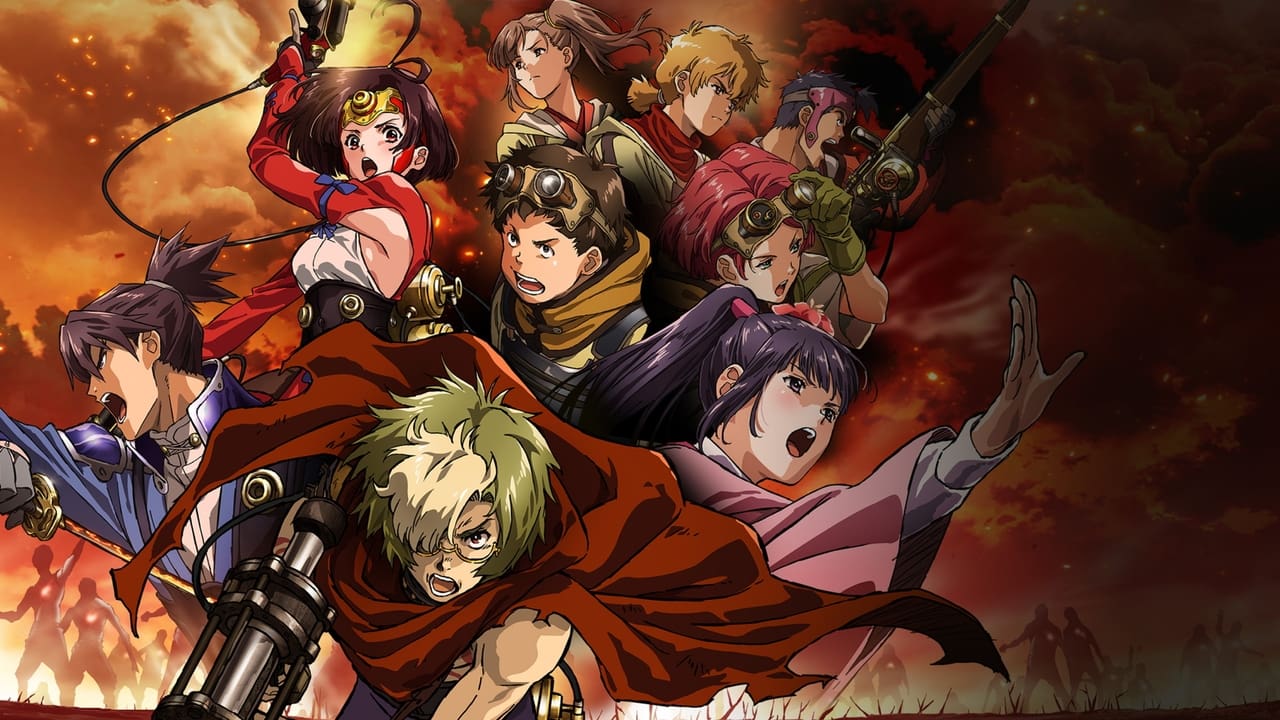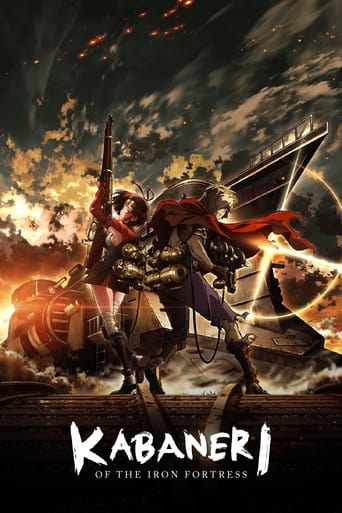Teringer
An Exercise In Nonsense
Brendon Jones
It’s fine. It's literally the definition of a fine movie. You’ve seen it before, you know every beat and outcome before the characters even do. Only question is how much escapism you’re looking for.
Sarita Rafferty
There are moments that feel comical, some horrific, and some downright inspiring but the tonal shifts hardly matter as the end results come to a film that's perfect for this time.
Celia
A great movie, one of the best of this year. There was a bit of confusion at one point in the plot, but nothing serious.
cacanindinb
While none of the elements of this show are highly original, the whole, in this case, is much greater than the sum of its parts. Set in medieval Japan, the characters have no effective weapons against countless undead zombies. Instead, they apply ingenuity to build defensive cities connected by a network of train tracks. The characters respond to dire challenges with relatable levels of bravery and wit, and the show moves from obstacle to obstacle at a blistering pace. Still, there is enough character interaction for us to form a connection and desire to seem them succeed. Dramatic sequences play out with surprising deft of color, angle, music cue, and character. Strap in for a thrilling ride.
jace-rynearson
I'll be brief, I love this anime already. I watched the first episode not really expecting much and I was amazed. I then watched the rest of the season, and loved every minute. The story is great, the animation is beyond top-notch, the voice acting and characters are great, and I absolutely love the music (especially the opening and closing themes). On top of all that, it's intense but also emotional, and it mixes those perfectly. I don't know why people keep saying it's an Attack on Titan clone, because it's not. It's it's own original idea. It takes a zombie apocalypse to a whole new level and it is great. All in all, it's one of those very rare perfect anime shows. Can't wait for the second season, I hope there's a second season.
yerandtedy
If you like poor writing, idiotic characters, implausible and copied plots (Yes, this does try to copy Attack on Titan), then this is the show for you! We have a lead character who is just implausibly stupid (I'm gonna test my gun instead of trying to flee the city.) As if the iron zombies are in short supply.... Then we get a 12 year old bi-polar ninja girl, and an antagonist who commits mass genocides for no real reason. No one trusts our Green haired protagonist until episode 4, despite him meeting all their demands and saving them several times. We are also forced to deal with a Steampunk element that is overplayed and uninteresting, especially in this world of over- used tropes (including Zombies! We don't have enough shows with zombies!) Want a shitty gore fest till something decent comes on? Then this 4hr season will kill your time and IQ.
sane1216
Having just watched Kabaneri of the Iron Fortress I wanted to quickly address some of the complaints about the similarities to Attack on Titan.The main similarities I see that someone could bring up between KotIF and AoT are these: 1) It takes place in a relatively post-apocalyptic setting. 2) Humanity is fighting against monstrosities threatening the existence of mankind. 3) Humanity lives in a walled city environment. 4) The walled city is breached in the first episode. 5) The main character wants revenge. 6) The main female character, so far, is stronger than the main male character. 7) There is some type of militarized fighting forced designed to protect the remnants of humanity against the monster threat. 8) The main characters have hybrid powers that help them fight the monsters.In these comparisons there are differences that set Kabaneri apart and the reason I say people are over-reaching to find a problem with these. For instance:1)In Attack on Titan the setting is 100+ years after the Titans appear. In Kabaneri of the Iron Fortress the time is still within the same period that the monsters appear, not 100+ years after it. 2)The monsters are not titans. They are not giants. I know some scenes make the monsters appear to be large, but when the humans, the Bushi warriors, fight the Kabane, the monsters, they all are of equal size with a few hulking or tall monsters here and there, but even then it is nothing beyond a tall human since the monsters are created when a Kabane bites an uninfected human. With that said, the Kabane are somewhat the equivalent to what most movies and television shows would call a Zombie. Not a giant. The Kabane/Zombie have the ability to heal, are stronger than normal humans, more durable, and for some reason their heart glows and is hard to pierce. Given that fact, piercing the heart and chopping off the head seem to be the only way to kill them which would also make the Kabane similar to the Western concept of a Vampire. Not a giant. Contrast this to AoT where the Titans are only killed by cutting out the nape of the neck. 3)In both stories humanity lives in a walled city, however, in Kabane of the Iron Fortress there is more than one walled city. In the opening scenes the train travels through one walled city, they call train stations that has already been overrun prior to the story starting. The walled city that the story starts in is another walled city and after that one is attacked by the Kabane you discover through character dialogue that there may be other surviving walled cities/stations. Contrast this to AoT's solo surviving human walled city. 4)As stated before, the second walled city you are introduced to is breached by the Kabane. Similarly, the walled city in AoT is breached. The differences are in how the breach happens. 5)The only similarity I can think of between the two main characters is Eren wants revenge against the Titans and hates them for the breach and the death of his mother and Ikoma wants revenge and hates the Kobane for something that happened in his past. The differences in these two characters are far more recognizable. Ikoma saves himself at a pivotal point in the story whereas had that been Eren, he would've gotten saved by Mikasa or someone else. Ikoma is aware of and starts to gain some relative control of his hybrid abilities despite misunderstanding them pretty early in the story whereas it takes Eren some time to figure out he is a Titan Shifter and how to control his abilities. In fact, deep into the manga, Eren still has a difficult time controlling his abilities. Their personalities are relatively similar, but one should chalk this up to anime and manga using stereotypical generic tropes in characterization rather than the creative team copying AoT into Kabaneri of the Iron Fortress. 6)Mikasa and Mumei, at least, start off stronger than the main male lead. I'll also add they both have somewhat of an odd, aloof, emotionless personality. I'd argue that Mikasa showed more emotion than Mumei early on in the story, but is somewhat of that stereotypical trope of an emotionless character who sometimes shows emotion. Still, the main similarity I see between the both of them is in strength. However, once again the differences are more prevalent. While Mikasa was good using the Vertical Maneuvering Equipment the corps used to fight Titans, Mumei started off with the impression she was simply good at fighting Kabane with fighting skills and the gas/air powered guns they use to pierce Kabane hearts 7)There is a militarized fighting force that defends and assaults the monster threat. In AoT these are the Survey Corps along with, I think, two to three other branches of the military. In KotIF, these are the Bushi warriors. While this is a general similarity, I don't think one could point to it with any real strength of an argument. 8)The main characters have hybrid powers, or the existence of hybrid powers. The problem with calling this a similarity to AoT and only AoT ignores the usage of this trope in a number of other anime and manga. Not only this, but again, Ikoma and Mumei have and use their hybrid abilities fairly early in the story whereas Eren doesn't unconsciously use his abilities until far later into the first season of AoT and even then it takes a small amount of time for the story to reveal it is Eren. In all this, this show offers a unique view of various tropes mentioned above. Ikoma, the main character alone doesn't simply cry about his situation or declare loudly how he will win and overcome. He actually does it and it makes sense despite the lack of tact during his victories.

